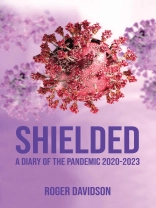The diary provides a wide-ranging commentary on one of the most life-changing events in modern history. From the first lockdown in March 2020 through to the Covid-19 Inquiries of 2023 it reflects on the social politics shaping the response of government to the pandemic. Throughout, it juxtaposes the everyday lived experience and coping strategies of a ’shielded’ member of the community with the competing agendas of Whitehall, Westminster, and Holyrood in their tortuous, sometimes comedic and often egregious efforts to contain the virus.
Part 1 of the diary captures the initial crisis posed by the belated imposition of lock-down, the critical lack of personal protection equipment and of effective testing and contact tracing procedures. It reflects on the shifting role of scientific and medical expertise within the policy-making process and the breakdown in political and public consensus over the timing and content of an ’exit’ strategy from lock-down in the autumn of 2020 in the face of a second wave of the pandemic.
In Part 2 the focus in the early months of 2021 is on the development of the first vaccines and the medico-political issues surrounding their production and distribution. Thereafter, the diary reflects the continuing efforts of the NHS to cope with new variants of Covid-19 and the re-emergence in government discourse of a ’herd immunity’ approach to managing the pandemic. The politics of Brexit and Indy Ref2 are seen increasingly to marginalise the pandemic in the media.
Parts 3 and 4 record the growing acceptance in 2022 that society would in the future have to live with the virus and that legal restrictions on movement would be replaced by individual risk assessment. The diary focuses on the gradual phasing out of ’test and trace’ and ’shielded’ status. It also charts the further normalization of the presence of Covid-19 and its variants. The process of investigating the conduct of the Government during the pandemic and especially Partygate and the cronyism in the awarding of contracts, increasingly occupies the entries as does the failure to clearly identify the processes and procedures that are needed when the existential threat of the next pandemic confronts us.
Om författaren
Roger Davidson is Emeritus Professor of Social History at the University of Edinburgh. He has published widely on the governance of sexual issues in modern Scotland. He is the author of Illicit and Unnatural Practices: The Law, Sex and Society in Scotland since 1900 (Edinburgh University Press, 2019). He was diagnosed with Parkinson’s disease in 2012.












